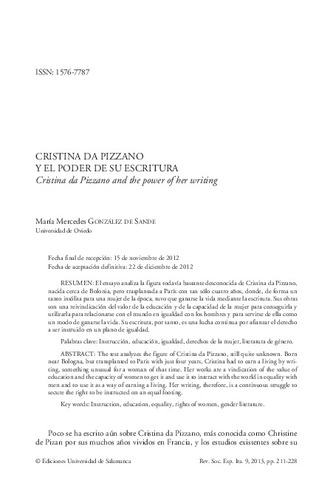Cristina da Pizzano y el poder de su escritura
Otros títulos:
Cristina da Pizzano and the power of her writing
Autor(es) y otros:
Palabra(s) clave:
Instrucción
Educación
Igualdad
Derechos de la mujer
Literatura de género
Fecha de publicación:
Editorial:
Ediciones Universidad de Salamanca
Citación:
Descripción física:
Resumen:
El ensayo analiza la figura todavía bastante desconocida de Cristina da Pizzano,nacida cerca de Bolonia, pero trasplantada a París con tan sólo cuatro años, donde, de forma un tanto insólita para una mujer de la época, tuvo que ganarse la vida mediante la escritura. Sus obras son una reivindicación del valor de la educación y de la capacidad de la mujer para conseguirla y utilizarla para relacionarse con el mundo en igualdad con los hombres y para servirse de ella como un modo de ganarse la vida. Su escritura, por tanto, es una lucha continua por afianzar el derecho a ser instruido en un plano de igualdad.
El ensayo analiza la figura todavía bastante desconocida de Cristina da Pizzano,nacida cerca de Bolonia, pero trasplantada a París con tan sólo cuatro años, donde, de forma un tanto insólita para una mujer de la época, tuvo que ganarse la vida mediante la escritura. Sus obras son una reivindicación del valor de la educación y de la capacidad de la mujer para conseguirla y utilizarla para relacionarse con el mundo en igualdad con los hombres y para servirse de ella como un modo de ganarse la vida. Su escritura, por tanto, es una lucha continua por afianzar el derecho a ser instruido en un plano de igualdad.
The test analyzes the figure of Cristina da Pizzano, still quite unknown. Born near Bologna, but transplanted to Paris with just four years, Cristina had to earn a living by writing, something unusual for a woman of that time. Her works are a vindication of the value of education and the capacity of women to get it and use it to interact with the world in equality with men and to use it as a way of earning a living. Her writing, therefore, is a continuous struggle to secure the right to be instructed on an equal footing.
The test analyzes the figure of Cristina da Pizzano, still quite unknown. Born near Bologna, but transplanted to Paris with just four years, Cristina had to earn a living by writing, something unusual for a woman of that time. Her works are a vindication of the value of education and the capacity of women to get it and use it to interact with the world in equality with men and to use it as a way of earning a living. Her writing, therefore, is a continuous struggle to secure the right to be instructed on an equal footing.
ISSN:
Colecciones
- Artículos [37541]
- Filología Clásica y Románica [276]
Ficheros en el ítem





